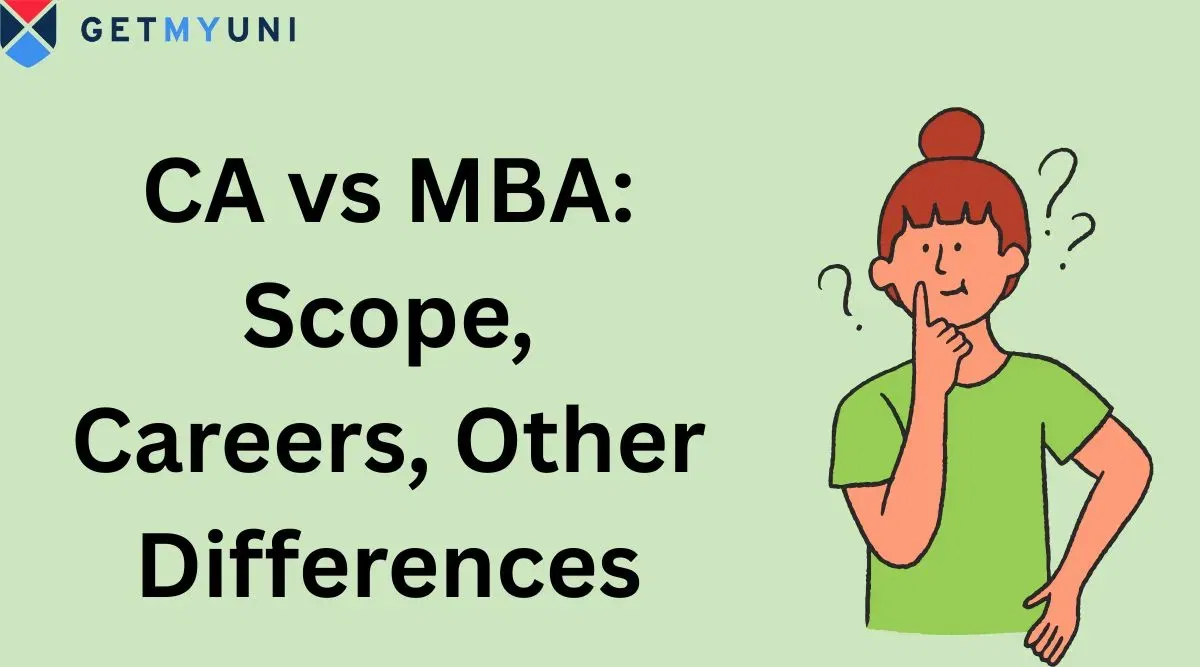CA vs MBA can be compared based on exams, eligibility criteria, duration of the course, career scope, salary and more. These differences can help the students to identify the pros and cons to choose the best course to pursue as their higher education.
Table of Contents
CA vs. MBA can be compared on various grounds for the students to choose the right path of higher education. Chartered Accountancy is a professional certification course in accounting, taxation, and finance that commerce students generally pursue to seek a career in accounts and auditing. On the other hand, MBA is a postgraduate degree that focuses more on the management-based studies essential for any organization's growth.
CA vs MBA Highlights
CA and MBA are two diverse courses with an unmatched reputation in the job market. To find out which suits the best, there are several criteria one should weigh before deciding. Some of the standard criteria for differentiation include fees, eligibility, course duration, and scopes.
Some of the primary differences between CA and MBA are discussed below.
| Criteria | CA | MBA |
| Duration of Study | 4 - 4.5 years | Two years combined with an internship period. |
| Fees | INR 2 Lakhs | INR 15 Lakhs |
| Eligibility | 50% in 10+2 commerce and should clear the CPT exam for admissions. | 50% in any undergraduate stream and should remove the CAT exam. |
| Governing Body | ICAI (Institute of Chartered Accountants India) | UGC (University of Grants Commission) |
| Domain of Study | Finance, Accounts, Internal Auditing, Taxation and | Business Management, Business Development, and Human Resources |
| Levels of examination |
Level 1 - CPT Exam Level 2 - IPCC Exam Level 3 - CA Final |
CAT/MAT/GMAT |
| Practical Exposure Offered | Articleship | Mandatory internships for six months. |
| Who can Pursue? | Students who are inclined towards accountancy and finance. | Students who have a knack for management and business development. |
| Career Options | Internal Auditing, Accounts, Finance, and Banking, etc | HR, Marketing, Sales, Finance, Data Analytics, etc |
Also Read: Online MBA vs Regular MBA
CA vs MBA from IIM
Chartered Accountancy is an internationally recognized course. CA has its history in India. The course was established under the chartered account act in 1949, directing the Indian government to form ICAI. A Chartered accountant has a broad scope of career, depending upon their specialization area. CA examines various government notifications, taxations, and other financial regulations as per the guidelines issued by the finance ministry. They also provide suitable suggestions according to the taxonomy legislation.
MBA is a broad field of study as it can lead you anywhere you want to specialize. MBA is one of the most popular management courses in India, and it has its prestige. The demand for MBA grads is witnessing a steady increase due to the number of startups India has begun to invest in.
Compared to CA, MBA is a very flexible course. The students with a technical background can also pursue an MBA course. MBA consists of various specialization courses available under a management belt. It helps students to excel in one field and diversify.
Also Read: MBA vs LLM: Which is Better?
CA vs MBA Eligibility Criteria
When it comes to eligibility criteria, both CA and MBA have pretty specific criteria. Eligibility criteria for CA and MBA are listed below:
- You need to have at least 50% in your 12th-grade final examinations and be from commerce groups to pursue CA. It will be very obnoxious if you're applying for CA in the science group, but you can take up B.Sc and knock on the doors via Direct Entry.
- Eligibility criteria for MBA courses require a similar cut-off percentage as CA. You should have at least 50% in your undergraduate degree and should've cleared the mandatory entrance examination. You're also expected to have good communication skills to clear the interview round post-examinations.
Also Read: MBA vs M.Sc
CA vs MBA Entrance Examinations
Admissions into CA and MBA courses are made via merit. Both courses have a separate set of entrance exams written as national-level or university-level entrance exams. There are two types of entrance exams for the CA course available for aspirants to secure admissions for the CA Foundation course. After completing 12th grade in commerce, students can directly join the IPCC course and take the CAT exam for the CA Foundation course. Students who are pursuing B.Com or BA are required to clear CPT examinations for CA Foundation admission.
On the other hand, MBA is a top-rated postgraduate course, and many examinations are accepted for admission nationwide. Students across multiple streams can appear for these examinations, irrespective of the stream of study. Some of the top MBA entrance examinations are :
- CAT
- GMAT
- XAT
- MAT
Also Read: MBA vs M.Com - Which is Better?
CA vs MBA Course Duration
The course duration of CA and MBA are very different from each other. Students take up CA after schooling. In that case, students must clear the Common Proficiency Test (CPT) to get admission into the program. In this case, the CA course duration is 4.5 years, including all levels of examination. In some cases, CA is also taken up after completing a B.Sc degree in any finance-related streams. For those people, the coursework lasts for three years, and the scheme is called the “Direct Entry Scheme.”
On the other hand, the course duration for MBA is two years, as per UGC Guidelines. MBA requires the applying aspirants to hold an undergraduate degree in any of the streams and clear the entrance examination for direct admission. Unlike CA, there are no other schemes for students to pursue this course.
CA vs MBA Examinations
CA is a progressive certification course and consists of 3 levels. A certified chartered accountant is required to clear all three levels of examinations. The number of attempts to clear these examinations isn't fixed. The CA course structure is divided into three groups, namely:
- CA Foundation
- CA Intermediate
- CA Final
Aspirants are given a free timeline to clear the levels in order. Even a CA Foundation certificate guarantees the graduate a scope of job in accounts and finance domains. There is no age limit to pursue CA certifications, making them accessible for all at any point in time.
Unlike CA, MBA doesn't vouch for flexible timelines. MBA is structured coursework and requires the graduates to adhere to the course guidelines for completion. UGC and the respective university govern the examinations conducted. Students should clear the test prescribed in the coursework for graduation.
Also Read: MBA vs EMBA - Which is Better?
CA vs MBA Which has a Higher Scope?
We know that both CA and MBA are highly reputed certifications. But what's their reputation in the current job market? Do they have equal scopes? Let's find out.
CA Job scope
CA is one of India's most prestigious certifications and can't be given a second thought about its credibility. Although many short-term diploma certifications in accounts and finance have emerged recently, CA certification has more weightage in job scopes.
- CAs may start freelancing after limited work experience or can also work in reputed CA firms and conglomerates. The wide range of scope that CA offers allows graduates to explore several areas of work. Graduates can work in industries for audit and accounts, banks for financial analysis, taxonomy firms, and plenty of other domains.
- The choice is up to the graduates to choose and work from an ocean of opportunities. Almost every organization requires an accounting and finance department, and there's an endless need for CA graduates to ensure its functioning.
- In addition to finance, graduates will also be trained to handle auditing, taxation, cost accounting during article training. This helps them to diversify their scopes much further and have opportunities to get roles in investment banking.
MBA Job Scope
MBA's ever-growing demand shows how good the job scopes are in the current job market. The key behind an MBA is the area of specialization in which the graduates complete their degree. MBA coursework offers theoretical knowledge and practical training that prepares the graduate to work under any given scenario.
- The need for management people in any organization is more vital than accounting and finance. A proper management structure is the backbone of an organization's success, and it requires highly skilled graduates with experience. MBA's diversity in terms of specialization has created new job openings in the even fields of data science and analytics.
- The new startup schemes powered by the MHRD have added more fuel to the job openings. A proper management structure is essential for any new company, which perfectly fits MBA graduates' bills. Understandably, we can expect a perpetual demand for MBA graduates over a period now.
Also Read: MBA vs PGDM vs MMS - Which is Better?
CA vs MBA Salary
Some of the critical factors that affect the pay scale include experience, area of specialization, and the domain they work in. Both sets of graduates have multiple job scopes, which entitle them to receive a diverse payscale. First, we understand the pay scale of CA graduates.
| Job Role | Average Payscale |
| Chartered Accountant | INR 7.39 LPA |
| Business Analyst | INR 6 LPA |
| Financial Planner | INR 8 LPA |
| Auditor | INR 7.77 LPA |
| Taxonomy Specialist | INR 8.1 LPA |
Just like chartered accountants, MBA graduates also work in diverse fields. The average pay of MBA graduates are listed below:
| Job Role | Average Payscale |
| Business Development Specialist | INR 6.3 LPA |
| Human Resource Manager | INR 7.02 LPA |
| Sales Manager | INR 4.33 LPA |
| Customer Relationship Management | INR 6.77 LPA |
| Marketing Manager | INR 7.01 LPA |
CA vs MBA Top Institutes in India
Numerous institutions in India offer CA and MBA courses. The top institutions for both the courses are discussed below, which may help you cater a better decision.
Top CA institutes in India:
- GITAMIM Vishakapatnam
- CSM Mysore
- ISBMA Chennai
- ISBMA Hyderabad
- ISBMA Kolkata
- GCEC Jaipur
- ISBMA Pune
- ISBMA Ahmedabad
- ISBMA Delhi
- XIBMS Mumbai
Top MBA institutes in India:
- IIM Ahmedabad
- IIM Bangalore
- IIM Calcutta
- XLRI Jamshedpur
- ISB Hyderabad
- SPJIMR Mumbai
- IIM Indore
- IIM Lucknow
- FMS New Delhi
- IIFT New Delhi
CA vs MBA Which is Better?
It's quite an anticlimax statement, but both are equally prestigious regarding the job market. The choice personally comes down to aspirants who are willing to pursue this course. CA's work area is mainly in finance and accounting, whereas MBA graduates have more diverse scopes to choose from.
From the criteria mentioned earlier, we can conclude that both sets of graduates can thrive in the job market. It boils down to the student's interests and choices, whether they're inclined more towards finance or management.























POST YOUR COMMENT